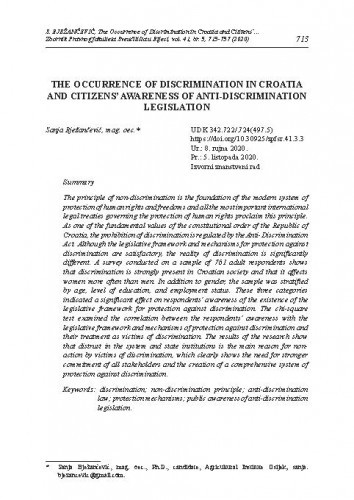The principle of non-discrimination is the foundation of the modern system of protection of human rights and freedoms and all the most important international legal treaties governing the protection of human rights proclaim this principle. As one of the fundamental values of the constitutional order of the Republic of Croatia, the prohibition of discrimination is regulated by the Anti-Discrimination Act. Although the legislative framework and mechanisms for protection against discrimination are satisfactory, the reality of discrimination is significantly different. A survey conducted on a sample of 761 adult respondents shows that discrimination is strongly present in Croatian society and that it affects women more often than men. In addition to gender, the sample was stratified by age, level of education, and employment status. These three categories indicated a significant effect on respondents’ awareness of the existence of the legislative framework for protection against discrimination. The chi-square test examined the correlation between the respondents’ awareness with the legislative framework and mechanisms of protection against discrimination and their treatment as victims of discrimination. The results of the research show that distrust in the system and state institutions is the main reason for nonaction by victims of discrimination, which clearly shows the need for stronger commitment of all stakeholders and the creation of a comprehensive system of protection against discrimination.; Načelo zabrane diskriminacija temelj je suvremenog sustava zaštite ljudskih prava i sloboda i svi najvažniji međunarodno pravni ugovori koji uređuju pitanje zaštite ljudskih prava proklamiraju ovo načelo. Kao jedna od temeljnih vrednota ustavnog poretka Republike Hrvatske, zabrana diskriminacije uređena je Zakonom o suzbijanju diskriminacije. Iako su zakonodavni okvir i mehanizmi zaštite od diskriminacije zadovoljavajući, stanje diskriminacije bitno je drugačije. Istraživanje provedeno na uzorku od 761 punoljetnom ispitaniku pokazuje da je diskriminacija u hrvatskom društvu snažno prisutna te da češće pogađa osobe ženskog spola. Osim po spolu, uzorak je stratificiran i po dobi, stupnju obrazovanja te njihovom radnom statusu i upravo te tri kategorije pokazuju značajan utjecaj na upoznatost ispitanika sa postojanjem zakonodavnog okvira zaštite od diskriminacije. Hi-kvadrat testom ispitana je veza između upoznatosti ispitanika sa zakonodavnim okvirom i mehanizmima zaštite od diskriminacije te njihovim postupanjem kao žrtava diskriminacije. Iz rezultata istraživanja je vidljivo da je nepovjerenje u sustav i institucije države glavni razlog nepostupanja žrtava diskriminacije što jasno pokazuje potrebu snažnijeg zalaganja svih dionika i kreiranje cjelovitog sustava zaštite od diskriminacije.; Der Diskriminierungsverbotgrundsatz ist die Grundlage des modernen Schutzes der Menschenrechte und Freiheiten und all die wichtigsten völkerrechtlichen Verträge die den Schutz der Menschenrechte regeln verkünden diesen Grundsatz. Als ein der Grundwerte der Verfassungsordnung der Republik Kroatien ist das Diskriminierungsverbot durch das Gesetz zur Bekämpfung der Antidiskriminierung geregelt. Obwohl der gesetzliche Rahmen und Schutzmechanismen zufriedenstellend sind, sei der Zustand der Diskriminierung besorgniserregend. Eine Untersuchung von 761 Volljährigen zeigt, dass die Diskriminierung in der kroatischen Gesellschaft stark präsent ist und häufiger weibliche Bevölkerung betrifft. Außer nach Geschlecht wurde die Untersuchung nach Alter, Bildungsgrad und Arbeitsstatus durchgeführt und diese drei Kategorien zeigen geradezu einen wesentlichen Einfluss auf den Grad der Vertrautheit der Befragten mit der Gesetzgebung für den Schutz vor Diskriminierung. Anhand von HI-Quadrat Test wurde die Beziehung zwischen den Befragten mit dem gesetzlichen Rahmen und Schutzmechanismen vor Diskriminierung und ihrer Behandlung als Diskriminierungsopfer überprüft. Die Ergebnisse deuten auf fehlendes Vertrauen in die staatlichen Institutionen als Hauptgrund dafür, dass die Diskriminierungsopfer keine Verfahren in die Wege leiten, weshalb ein stärkerer Einsatz seitens aller Teilnehmer notwendig ist, um ein einheitliches System des Diskriminierungsschutzes zu schaffen.; Il principio di non discriminazione sta alla base del sistema moderno di protezione dei diritti umani, delle libertà e di tutti i trattati internazionali più importanti governati dalla protezione dei diritti umani che proclamano questo principio. Come uno dei valori fondamentali dell’ordinamento costituzionale della Repubblica di Croazia, il divieto di discriminazione è regolato dalla Legge sul divieto di discriminazione. Nonostante il quadro normativo ed i meccanismi per la protezione contro la discriminazione siano soddisfacenti, la realtà è ben diversa. Il sondaggio condotto su un campione di 761 adulti intervistati dimostra che la discriminazione è fortemente presente nella società croata e che colpisce più spesso le donne rispetto ai maschi. In aggiunta al genere, il campione è stato stratificato secondo l’età, il livello di educazione e lo stato occupazionale. Queste tre categorie indicano un effetto significante sulla coscienza degli intervistati dell’esistenza del quadro normativo per la protezione conto la discriminazione. Il test del chi-quadro ha esaminato la correlazione tra la coscienza degli intervistati insieme al quadro normativo con i meccanismi per la protezione contro la discriminazione ed il trattamento di essi come vittime della discriminazione.
Sažetak

